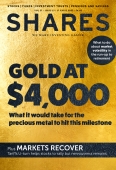Archived article
Please note that tax, investment, pension and ISA rules can change and the information and any views contained in this article may now be inaccurate.
Why do share buybacks matter so much nowadays?

These days it seems as though every company and their dog are buying back shares, if the morning flood of RNS (regulatory news service) announcements is anything to go by.
Out of 300-odd news stories each day from 7am, by our reckoning over a third are ‘transaction in own shares’. Although it remains to be seen whether that trend will continue in the face of market turbulence. Notably Tesco (TSCO) unveiled a £1.45 billion buyback on 10 April in the wake of the tariff-related selling.
So, what is it with buybacks that makes every chief executive and chief finance officer think it’s a good way to allocate capital?
WHY ARE SHARE BUYBACKS SO POPULAR?
Buybacks are a clever (and tax-efficient) way to increase shareholder returns as they reduce the number of shares in issue.
When companies pay special dividends, investors end up paying tax on the extra income unless they hold the shares in a tax wrapper such as a SIPP or an ISA.
When a company buys back shares, on the other hand, it usually cancels them, which means each of the remaining shares receives more in earnings and dividends and is more valuable as a result.
Now that companies are familiar with the need to ‘maximise’ shareholder value – including investment trusts, thanks to the arrival of activists – everyone wants to be seen to be doing the right thing by their investors.
According to AJ Bell investment director Russ Mould, who keeps a close eye on buybacks and other corporate actions, in the first three months of this year FTSE 100 companies have announced a whopping £29 billion-worth of share purchases.
Annualising that figure for the whole of 2025 would mean £116 billion of buybacks, which is more than the combined total of 2023 and 2024 and gives you some idea of just how popular they have become.
Even small-cap companies with barely any surplus cash are buying their own shares, either because they think they are too cheap or as a sign they are confident about the outlook and therefore they are a good bet – time will tell.
OPTIONS FOR SURPLUS CASH
All companies have what is known as a capital allocation framework which sets out what they will do with surplus cash flow once they have spent what they need to on maintenance, settled all their bills and paid interest on their debt, assuming they have any.
For most companies, it reads as follows:
- Invest in the business for organic growth
- Look for acquisitions to supplement growth
- Pay down existing debt
- Increase shareholder payouts via dividends or buybacks
Probably the best example of a company which generates genuinely surplus capital – because its investment needs are minimal, it never makes acquisitions and it has no debt – is FTSE 100 newcomer Games Workshop (GAW).
Every now and then, when the company finds itself with surplus cash, it announces a dividend.
It doesn’t have a calendar and it doesn’t make regular payouts, but in the last 12 months it has announced five ‘one-off’ dividends (last July, last October, last December, this January and this March) to rid itself of unwanted cash to the tune of 520p per share.
It could, of course, use the money to buy back its own shares, but we suspect the company would rather let investors make that decision for themselves.
Buying back its own stock at current levels may not add value for shareholders, if the intrinsic value of the business is below that level (we’re not saying intrinsic value is below the current price, but if it is then the company would be doing shareholders a disservice by launching a buyback).
NO BUYBACKS AT BERKSHIRE
One company with a huge cash pile, which isn’t buying back shares, is investment conglomerate Berkshire Hathaway (BRK-B:NYSE).
As of the end of 2024 its cash pile of $334 billion exceeded the value of its listed holdings, leading founder Warren Buffett to go on the defensive.
‘Despite what some commentators currently view as an extraordinary cash position at Berkshire, the great majority of your money remains in equities. That preference will not change,’ said Buffett.
‘Berkshire will never prefer ownership of cash-equivalent assets over the ownership of good businesses, whether controlled or only partially owned,’ emphasised Buffett.
All that was offered by way of explanation for the cash pile was that ‘often, nothing looks compelling; very infrequently, we find ourselves knee-deep in opportunities.’
Berkshire halted share buybacks in the final quarter, suggesting Buffett doesn’t believe the stock is undervalued, and there was no hint the firm would pay a dividend.
Buffett loves receiving dividends, but it is very much a one-way street – only once has Berkshire paid a dividend, back in 1967, and to this day Buffett jokes he must have been in the bathroom when the decision was made.
He would rather invest in the businesses he owns to grow their margins, grow their markets, improve their existing products or come up with new ones.
WHAT’S WRONG WITH HOLDING CASH?
There is nothing fundamentally wrong with companies sitting on cash – like investors, having cash gives them options, added to which if interest rates are going to stay higher for longer, it can earn a decent income to boot.
Shares quizzed a couple of chief executives and finance directors at firms with cash on the balance sheet to ask what they planned to do with it, and the responses were quite eye-opening.
John Morgan, managing director of urban regeneration and fit-out firm Morgan Sindall (MGNS), was unapologetic about the build-up of cash on the company’s balance sheet.
Having ended 2024 with net cash of £492 million, equivalent to almost a third of its market cap, Shares asked whether a buyback was on the cards.
Morgan was quite clear – his, and the board’s single, overarching principle surrounding capital allocation is to maintain a strong balance sheet and hold ‘significant net cash balances at all times’, giving the group a competitive advantage in winning future work but also giving it a ‘buffer’ in the event of a downturn in the economy.
There are likely to be ‘significant’ opportunities to grow the partnership business, which will require cash, and Morgan is open to opportunities to acquiring pre-existing partnership development schemes or land to complement the existing business.
Only once all options have been considered and cash is truly deemed ‘surplus’ would it be returned to shareholders, so we wouldn’t hold our breath.
Since announcing its full-year results, the firm has raised its outlook for 2025 thanks to an acceleration in trading at the fit-out division, and over the last year the shares are up 45% against a 1% loss for the FTSE 250 so shareholders haven’t exactly lost out.
Another firm with a large cash pile relative to its market cap is workplace benefits and health insurance provider Personal Group (PGH:AIM).
As at the end of last year the company had cash and bank deposits of £27.4 million and no debt, compared with a current market cap of £80 million.
Some of that cash came from the sale of Let’s Connect, but the majority is from operating free cash flow, which is only set to grow as the company wins more business.
Shares asked chief executive Paula Constant and chief finance officer Sarah Mace what their plans were for this growing cash pile.
‘We’ve really refined our go-to-market approach to make it even easier for customers to sign up, and we’ve got great momentum,’ said the chief executive.
‘There is a significant market opportunity in front of us, our insurance and benefits offerings are more relevant than ever in the current climate and having cash gives us options in what is an under-penetrated but huge addressable market.’
That doesn’t mean Constant and Mace are about to go on a spending spree, however – any M&A target would need to be absolutely right, financially and culturally, to justify management time and resources as well as cash.
Again, with the firm having just notched up its best-ever two months of leads through its partnership with Sage (SGE) and the shares up almost 60% over the past year, investors aren’t exactly being shortchanged.
Disclaimer: AJ Bell, referenced in this article, owns Shares magazine. The author (Ian Conway) and editor (Tom Sieber) of this article own shares in AJ Bell.
Important information:
These articles are provided by Shares magazine which is published by AJ Bell Media, a part of AJ Bell. Shares is not written by AJ Bell.
Shares is provided for your general information and use and is not a personal recommendation to invest. It is not intended to be relied upon by you in making or not making any investment decisions. The investments referred to in these articles will not be suitable for all investors. If in doubt please seek appropriate independent financial advice.
Investors acting on the information in these articles do so at their own risk and AJ Bell Media and its staff do not accept liability for losses suffered by investors as a result of their investment decisions.
Issue contents
Editor's View
Feature
Great Ideas
News
- Housing services provider Mears hits five-year high on ’beat-and-raise’
- Weak US market and operational difficulties sink TT Electronics stock
- Tesco shares drop on fears it will launch ‘price war’ to raise market share
- Can Relx maintain its strong performance in the first quarter?
- Is this the end of the road for Tesla bulls?
- After discovery bright spot for BP what next for UK energy giants?
- Markets recover some poise after tariff U-turn
 magazine
magazine








